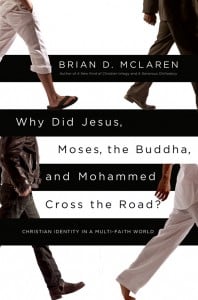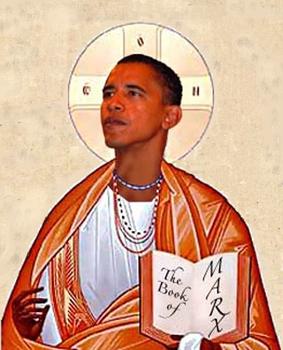
This post is part of an inter-faith discussion on Brian McLaren’s new book Why Did Jesus, Moses, the Buddha and Mohammed Cross the Road?, hosted at the Patheos Book Club.
Brian McLaren is an evangelical Christian pastor with a deep interest in interfaith outreach and dialogue. This book is probably the culmination of his life’s work in that regard, and in it he seeks to build a foundation on which Christians can effectively communicate with other faiths. The target audience for this book are not Muslims, Hindus and Jews, but his fellow Christians. He seeks to transform the model for interaction of Christians with non-Christians from an oppositional, hostile stance to a benevolent, cooperative one in order to achieve shared goals. As he puts it, this is a “shared journey”, not prosletyzation:
[It] is not the call to convert from your religion to mine. It is, rather, the invitation for both of us to seek a deeper conversion that begins in our deepest religious identity and transforms all of life.
McLaren’s book falls into what I like to think of as the Engineer Monk category: a focus on outcomes and alliances, with absolutely no intention of compromise on theology. That’s something I really respect, and what is usually lacking from more liberal attempts at interfaith dialogue that only seek to affirm commonalities of faith in the broadest (and most useless) terms. I think the best singular example of an Engineer Monk was Pastor Rick Warren, who spoke at the ISNA conference in 2009. From the transcript:
Now I was asked to speak to you about how Muslims and Christians can work closer together for the greater good, in our world. And I will tell you that I am not interested in interfaith dialogue, I am interested in interfaith projects. There is a big difference. Talk is very cheap. And you can talk and talk and talk and not get anything done. Love is something you do. It is something that we do together. Love is a verb. Now as the two largest faiths on this planet, Muslims and Christians, we must lead in this. We must lead.
Warren’s full remarks at ISNA go into quite explicit detail about what specifically he thinks Muslims and Christians should do for and with each other, and I certainly hope McLaren has an opportunity to review that speech and comment on how it meshes with his vision in the book.
Another example worth mentioning of the Engineer Monk is the book “Between Allah and Jesus” by Peter Kreeft. The purpose of this book was to force a debate within Christianity, not about how it relates to other faiths but to try and gain inspiration from Islam’s adherents’ zeal and apply that to Christianity. The book is structured as a dialogue between various students at a university, a muslim and an evangelical Christian among them. I engaged in a cross-blog dialogue with “Jazz Theologian” Robert Gelinas about this book; here are two excerpts (one, two) from the book and my response to each.
What McLaren is trying to do is to combine aspects of both Warren’s and Kreeft’s approaches. Early on, he introduces a model of Christian identity as a linear axis, ranging from “Weak/Benign” at one end and “Strong/Hostile” at the other. He then rejects that model for a new one that adds “Strong/Benevolent” as a perpendicular axis. I found this discussion (in Part 1 of the book, entitled The Crisis of Christian Identity) to be quite resonant with issues of Muslim identity in the west as well. There is a similar need to add a benevolence dimension to our existing axis of strength vs weakness, so we can decouple hostility from strength.
The recent response of Muslims overseas to the various insults against the Prophet SAW is a great example of the utility of this model for identity. Western muslims are caught in a bind*. How do we express our Strength; ie our belief in our Prophet and our deep grievous hurt at the insults to him, without compromising our Benevolence; our adherence and deep belief in freedom of speech? (Because freedom of speech is inextricably entwined with the very freedom of religion that permits Muslims in America to be more free in their pursuit of Deen than anywhere else in the world). If we can conceive our identity as perpendicular to that same hostile/benign axis, then we aren’t forced to choose between two equally unpalatable reactions to this kind of provocation.
There’s a lot more in the book to comment on and appreciate, but I’ll save that for later entries in this cross-blog discussion. I do look forward to hearing McLaren’s thoughts on how Warren’s speech and Kreeft’s book fit (at least the excerpts linked above) fit into his broader argument. And how he feels about being called an Engineer Monk 🙂 (Hopefully, in the spirit of praise in which it was intended!)
*specifically, Bateson’s Double-bind.











